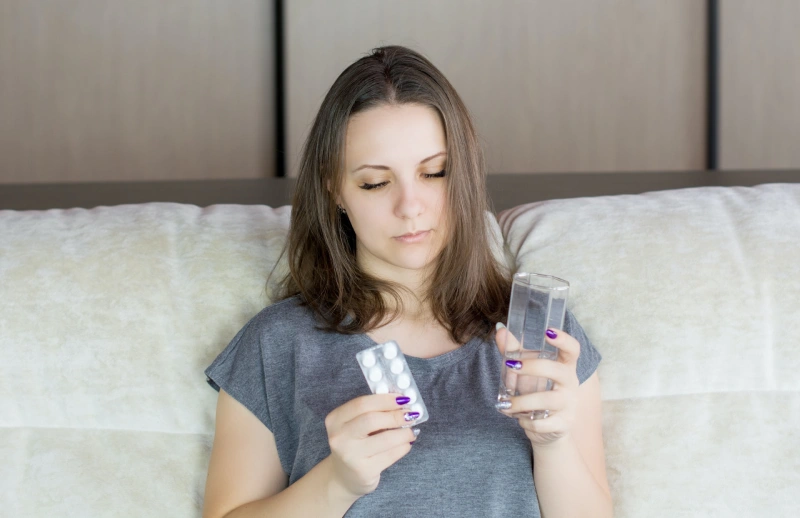Between the breakouts, back pain, mood swings, bloating and cramps, having your monthly period suck enough. But for some women, the symptoms mentioned above aren’t even the only ones on their list. Toss in flu-like symptoms and their period experience is complete.
Some women experience period flu. During their time of the month, they experience body aches, headaches, nausea and even a slight fever. Combine the flu-like symptoms with the fact that it’s 2021 (aka the season of COVID-19), some women end up panic-testing on their period.
So, what can you do to make “that time of the month” more bearable while keeping your paranoia at bay? What are the symptoms of period flu? Does dizziness before your period count? When should you get tested for COVID-19?
Before you get overwhelmed with these questions, it’s important to learn more about period flu — one step at a time.
Understanding Period Flu: What Causes The Period Flu?
The period flu is not an illness or an actual virus. It’s your body’s reaction to menstruation. It is kind of similar to premenstrual syndrome (PMS) symptoms but on a higher scale. The fluctuating symptoms and the fever you get on your period are not in your head; period fluid is the real deal.
Like PMS, period flu happens at some point in your cycle. You could feel sick and experience dizziness before your period or feel so tired during ovulation. Not everyone experienced period flu, but those who do list down a set of concerns and symptoms.
Below are the common period flu symptoms:
- Dizziness
- Headache
- Nausea
- Constipation
- Diarrhea
- Muscle aches
- Fatigue
- Chills or fever
- Cramps
Fortunately, you won’t get any yeast infections after your period, but you will experience flu before and during your time of the month.
What Causes Period Flu?
There is no clear cause behind the period flu symptoms you experience, but hormone fluctuations throughout your cycle are most likely to blame.
Cyclic changes in your sex hormones (particularly estrogen) can cause you to feel tired or sick, along with triggering other run-of-the-mill period symptoms like mood swings, cramps and breast tenderness.
Also, before your period, the body produces prostaglandins, which are hormone-like acids that help the uterus shed its lining. If too much of this acid makes its way to your bloodstream, you can also experience period flu symptoms.
How Long Does Period Flu Last?
Period flu episodes often last two weeks or less. Period flu symptoms manifest after ovulation, which is the last two weeks of a regular 28-day menstrual cycle. The symptoms usually improve after the beginning of your period and end on your last day.

The Difference Between Period Flu and COVID-19
Period flu symptoms are often similar to those of the flu, which can cause one to think that they might have COVID-19.
The symptoms shared by period flu and COVID include:
- Gastrointestinal issues
- Muscle aches
- Fatigue
- Headaches
The only way to confirm whether you’re positive for COVID or not is to take a COVID-19 test. Anyone who develops symptoms of COVID-19 should get the test, regardless of what point you are in your cycle.
How Do I Beat My Period Flu?
Coming down with period flu can make it difficult to function, but there are some things you can do for relief.
To ease your symptoms now:
- Use a heating pad. This relieves muscle aches and cramps. Place the heating pad over your lower abdomen for 10 minutes. Repeat this throughout the day (or when you need it).
- Take over-the-counter pain medication. OTC anti-inflammatories like ibuprofen can ease breast pain, headaches, cramps and muscle aches. Taking this medication can also reduce bleeding and pain.
- Stay hydrated. Drink plenty of water. PMS can make you want to eat more, which includes unhealthy salty food. Staying hydrated keeps your cravings at bay while easing your headache.
To prevent future bouts of period flu:
- Exercise regularly. Exercise regularly to improve the discomfort associated with your period.
- Eat healthily. Making healthier choices two weeks before your period can reduce PMS symptoms. Cut back on your caffeine, salt, sugar and alcohol intake.
- Get enough sleep. Aim to get at least seven to eight hours of sleep at night. Not getting enough sleep can cause compulsive eating and food cravings, as well as trigger headaches.
Period flu happens, so don’t panic. Instead, give yourself some rest. Go and warm up in your bed and soak up on rest.


